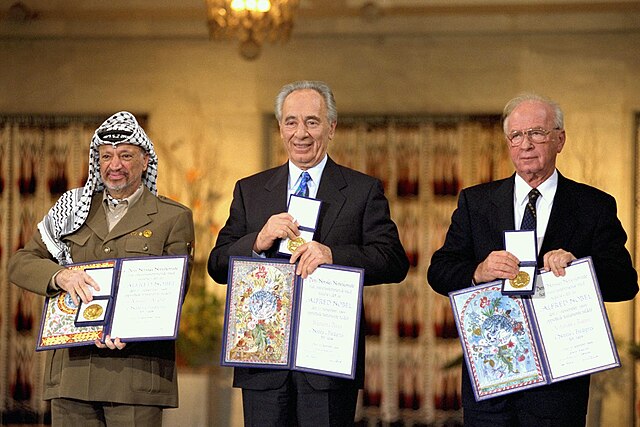Israeli–Palestinian peace process
Intermittent discussions are held by various parties and proposals put forward in an attempt to resolve the ongoing Israeli–Palestinian conflict through a peace process. Since the 1970s, there has been a parallel effort made to find terms upon which peace can be agreed to in both the Arab–Israeli conflict and in the Palestinian–Israeli conflict. Notably the Camp David Accords between Egypt and Israel, which included discussions on plans for "Palestinian autonomy", but did not include any Palestinian representatives. The autonomy plan would not be implemented, but its stipulations would to a large extent be represented in the Oslo Accords.
(right to left) Yitzhak Rabin, Shimon Peres and Yasser Arafat receiving the Nobel Peace Prize following the Oslo Accords
Israeli West Bank barrier in Bethlehem
Yitzhak Rabin, Bill Clinton, and Yasser Arafat at the Oslo Accords signing ceremony on 13 September 1993
President George W. Bush, center, discusses the peace process with Prime Minister Ariel Sharon of Israel, left, and Palestinian President Mahmoud Abbas in Aqaba, Jordan, 4 June 2003.
Israeli–Palestinian conflict
The Israeli–Palestinian conflict is an ongoing military and political conflict about land and self-determination within the territory of the former Mandatory Palestine. Key aspects of the conflict include the Israeli occupation of the West Bank and Gaza Strip, the status of Jerusalem, Israeli settlements, borders, security, water rights, the permit regime, Palestinian freedom of movement, and the Palestinian right of return.
Haganah ship Jewish State carrying illegal Jewish immigrants from Europe at the Haifa Port, Mandatory Palestine, 1947
Aftermath of a Palestinian suicide bombing on a bus in Tel Aviv
Yitzhak Rabin, Bill Clinton, and Yasser Arafat during the Oslo Accords on 13 September 1993.
Israeli West Bank barrier in Bethlehem






